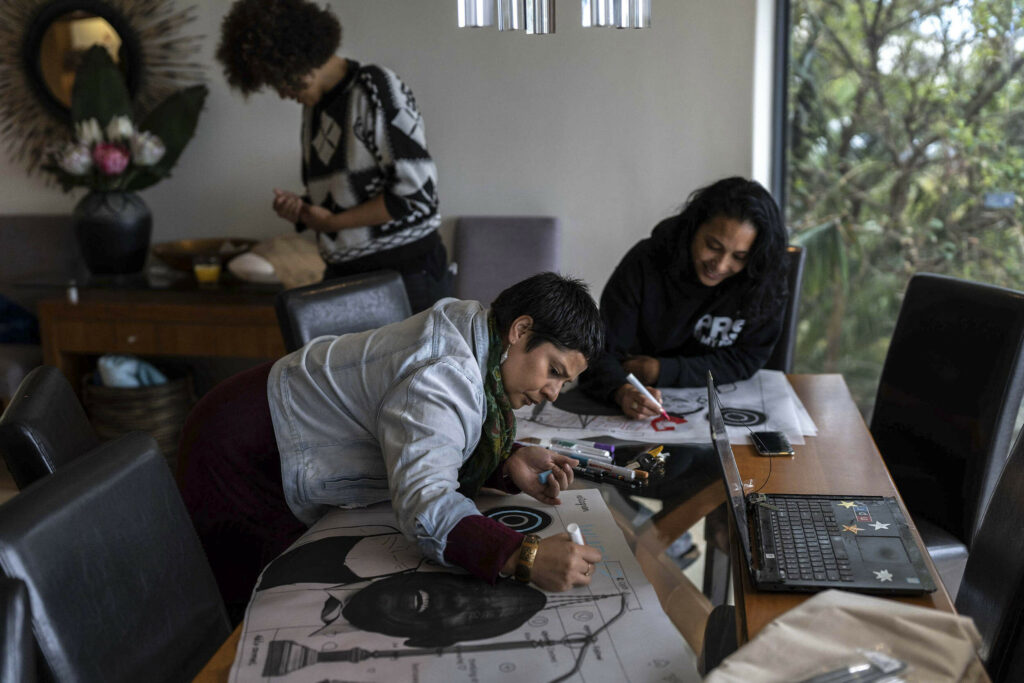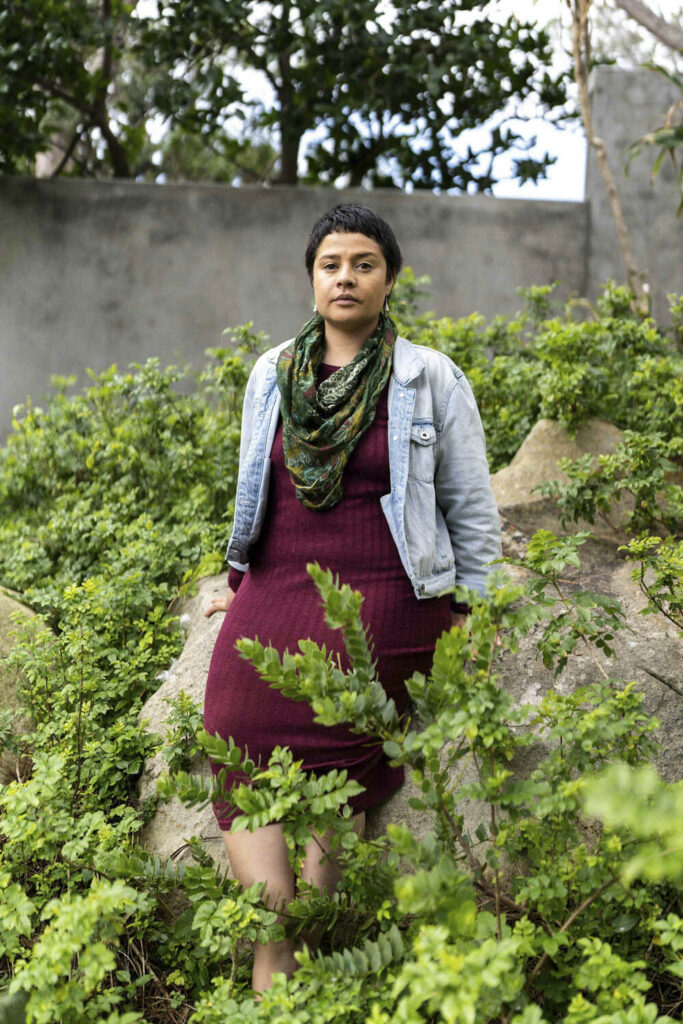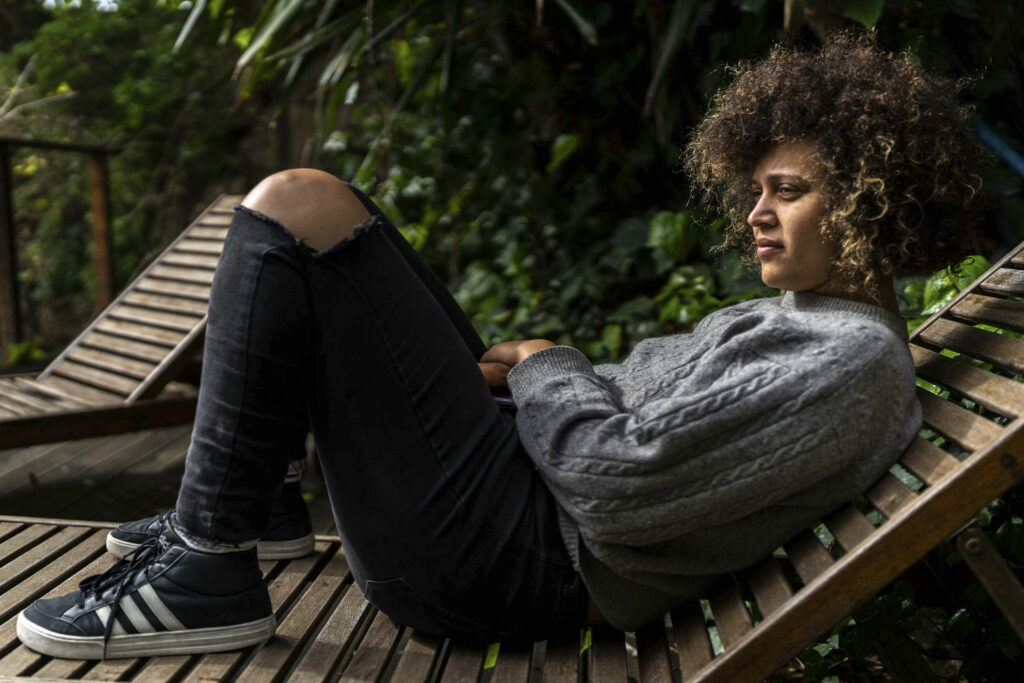Safe space: It took Kelly-Eve Koopman and the others in the collective months to research, conceptualise and raise money for the occupation. (Photos: Barry Christianson/New Frame)
Upon first stepping into the luxurious, three-storey Camps Bay house, Lethabo Hanong felt a surge of conflicting emotions. “I don’t want to lie to you, I was perplexed. I had lots of mixed emotions. There were so many emotions it was difficult to connect with them. I was sad, I was happy, I was confused… I was everything. You could name an emotion, I was feeling it.”
Hanong, who identifies as a non-binary transgender woman, is a member of the queer feminist collective #WeSeeYou that has been making headlines recently since occupying the Camps Bay house in a bid to highlight the socioeconomic inequalities to which queer people are particularly vulnerable.
Hanong was left homeless after being rejected by their family. “It happened when I started with hormone replacement therapy. My mother was okay with it at first, until my brother found out. He said my mother must do something about it and if she doesn’t, he will stop giving my mother money.
“Eventually, she took his side because my brother is the one who brings income into the house and I was unemployed, so…”
Hanong was offered a roof over their head by fellow collective members Sarah Summers and Kelly-Eve Koopman, whose rented home had, for months prior, served as something of a shelter for women and queer folk left destitute during the coronavirus pandemic.
 Lethabo Hanong, a poet from Khayelitsha, is a transgender woman in the first phase of their hormone therapy. They are part of a collective occupying a luxury apartment in Camps Bay.
Lethabo Hanong, a poet from Khayelitsha, is a transgender woman in the first phase of their hormone therapy. They are part of a collective occupying a luxury apartment in Camps Bay.
Summers, one of the founding members of the collective, said: “I think even prior to Covid-19, most people that were woke knew … that across the entire world, there is a system of injustice that’s been portrayed as the only way the world can exist. When Covid-19 came, it amplified that knowledge to people who had managed to disassociate. But for me, personally, it made it so loud that I wouldn’t have been able to exist if I didn’t do something. So I spoke to my partner and people I trust and from that, we started to broaden.”
According to Koopman, it took “three or four months of research, organising and culture-building” before the group booked the house through Airbnb intending to remain and occupy it once the three-night stay they paid for was over.
“In this street alone, most of these places are standing empty,” Koopman said. “I mean, we did the research and looked at the profiles of these places and there are so many houses that, for months and months on end, had nobody living in them – during a time when we are at a crisis. And that is because it is so unfathomable to think about simply using existing infrastructure to accommodate and provide safe spaces for poor black people, for women, for queers, for people that ‘don’t belong here’.”
Solidarity in occupation
On a rainy Sunday afternoon, the day before the occupation officially kicked off, the house was bustling with nervous activity. At the kitchen’s entrance, a generator stood ready in case the electricity supply was to be cut off. Cupboards were stocked with canned foods. One of the occupants cooked a pot of pap while others busied themselves scrawling slogans – “We see you”, “Stop killing us” and “Normalise occupying” – on posters that were later plastered across the area. On a large table overlooking the beachfront in the distance, impepho smudge sticks waited to be burned. “We did a cleansing of the house yesterday,” said Hanong.
They have usurped a 21st-century laager of privilege to make their point. Whether you agree or not, their point has been made
Dressed in a T-shirt featuring a picture of Winnie Madikizela-Mandela and sitting cross-legged on the lounge floor’s shag rug, Koopman said: “This is a peaceful action, which we are doing in solidarity with other occupations. Everyone [in this group] comes from different backgrounds. But we decided quite soon that it was going to be a queer and POC-only [people of colour] space. We wanted it to be a queer-centred and led space because there are so few queer-led safe spaces, where we don’t have to engage with queerness and gender politics as another kind of struggle, as something that we have to fight for. And that’s been really, really incredible and very healing.”
Bradley Rink is a senior lecturer at the University of the Western Cape who specialises in mobility, cities and urban identities. For Rink, the occupation did not come as a surprise “considering Cape Town’s spatial inequalities and violence against queer individuals and communities.
“Covid-19 has not only destroyed many lives and livelihoods, but it has also acted to rupture existing inequalities that have been lurking below the surface – but that have been long understood and experienced by many,” said Rink. “What is perhaps surprising is the way that the occupiers have drawn their own ‘pink line’, building on the title of Mark Gevisser’s recent book, and shone a light on the intersectionalities of exclusion, including race, sexual [orientation] and gender identity.”
 From left: Sarah Summers, Xena Scullard and Devaarne Muller. The collective made posters highlighting issues related to land and gender-based violence and put them up around the city the day before the occupation.
From left: Sarah Summers, Xena Scullard and Devaarne Muller. The collective made posters highlighting issues related to land and gender-based violence and put them up around the city the day before the occupation.
Rink added that though South Africa has a long history of protest action and land occupation, the strategy employed by the collective is new. “What is unique about this situation is the way that the occupiers have made their point by interrupting the so-called sharing economy that is an important feature of short-term letting of holiday accommodation in Cape Town. From a geographical perspective, protest demonstrates the power to articulate mobility. By occupying a property in an exclusive suburb of Cape Town, the occupiers have immobilised others by mobilising themselves. They have usurped a 21st-century laager of privilege to make their point. Whether you agree with them or not, their point has been made clearly.”
Normalising occupying
 20 September 2020: For Xena Scullard, it is important to choose a family and decide what safety, abundance and care look like.
20 September 2020: For Xena Scullard, it is important to choose a family and decide what safety, abundance and care look like.Democratic Alliance ward councillor Rob Quintas is among those who disagrees with the occupation. In a statement deriding the collective’s action as “reckless, self-indulgent and counterproductive”, Quintas wrote: “It is disingenuous that the group has chosen to put their interests above those of the thousands of workers employed in the Airbnb industry. It is surely foreseeable that homeowners will no longer offer their houses to let as Airbnb tourist venues if this can result in illegal occupation.”
#WeSeeYou member Xena Scullard hit back. “This is, we dare say, a very fucking clever way to normalise occupying [and becoming] less reliant on a state that is seeking to bide time, that is captured and that is also keeping the [wealthy] comfortable where they are because, you know, nobody touches them. And so we dare touch them in this way,” said Scullard, to the agreeing nods of other members in “the family”, as they refer to each other.
“For people like us, historically, family isn’t this nice, white-picket-fence space,” Scullard said by way of explanation. “Family can often be very fucking violent. It can be very dysfunctional and it can be very traumatic. So, over these past months of organising, it was really important for us to sit with that trauma in our group and try to work through it. Because we come with that trauma. It was important for us to be able to say we can choose a family and we can choose what it looks like. We can choose what safety looks like, we can choose what abundance and care looks like. Care has been very important in our group.”
 Vatheka Halile, a narrative poet from Khayelitsha, notes that people occupying vacant land are often brutally violated.
Vatheka Halile, a narrative poet from Khayelitsha, notes that people occupying vacant land are often brutally violated.The potential for a violent fallout to their occupation is something of which the collective is well aware. “I’m very scared, yes,” Vatheka Halile conceded. “But, you know, we have to do this. Covid-19 has shown us that we are really vulnerable … Some of our people took over public land in locations like Khayelitsha and Mfuleni … and they were brutally violated. The land that they were taking, people were saying it belongs to the City of Cape Town or to [big corporations]. So where is our land? Where is the space for us? Where?”
Summers added that, for the collective, “it’s also about choosing what violence you are going to endure”. “Many of us have a lived experience that hasn’t been very safe for us. As a collective, we talk about fear all the time. But we also talk about moving through that fear and using the collective to hold ourselves and each other safe. We know the risk we are putting ourselves under, but we still choose it. Hopefully, we will be given the opportunity to really show how we as a country of all types could work together to make change, to create the kind of economy where we are all safe. Because the one right now doesn’t work.”
In a joint statement issued by two queer rights organisations, Gender DynamiX and the Triangle Project, the non-governmental organisations noted that they were “in the process [of setting] up conversations with the queer collective … to determine what our next steps could be to address the issues the collective is raising”.
A little more than a week after taking occupancy of the house, and on the day of Hanong’s 23rd birthday, the group was issued with an eviction notice from the sheriff of the court. The notice did little to change Hanong’s mood. “I feel like a human being since I am here in this house,” they said. “I feel like I belong. Even though it is difficult for me to go out and take a walk, things will get better. I feel safe here. I just want a safe place, a place where I will be able to take my meds and feel free to be me, not pretend to be someone else. And for the first time in a long time, I feel safe.”
 Sarah Summers is a founding member of a queer collective whose members are fighting systems of injustice.
Sarah Summers is a founding member of a queer collective whose members are fighting systems of injustice.
On 2 October, the high court in Cape Town ruled that the collective has until noon on 8 October to vacate the property.
This is an edited version of an article first published by New Frame